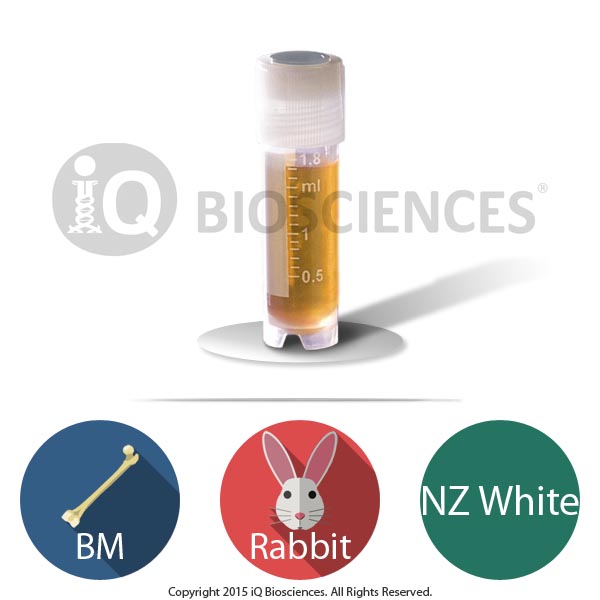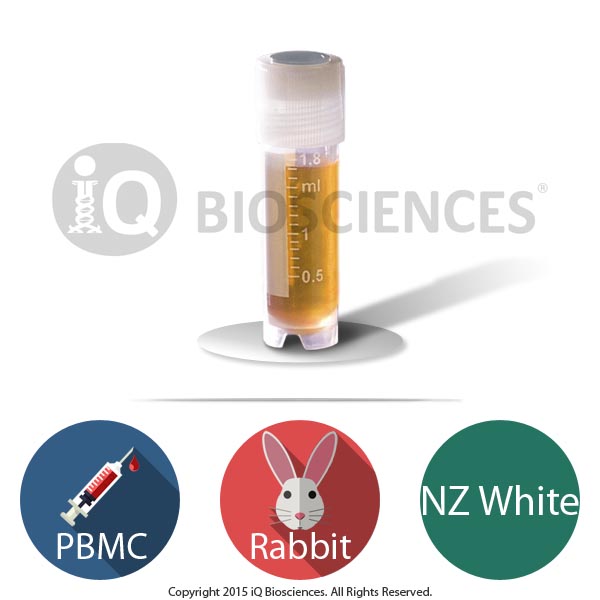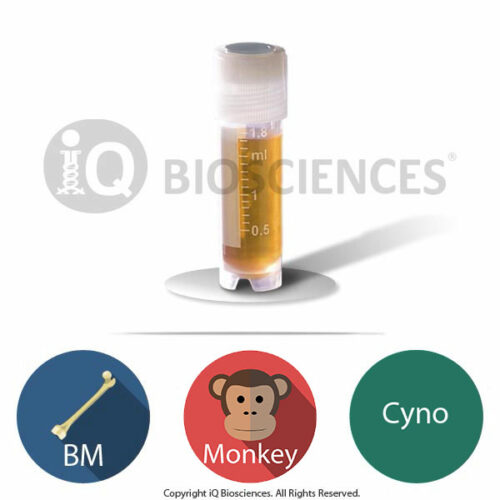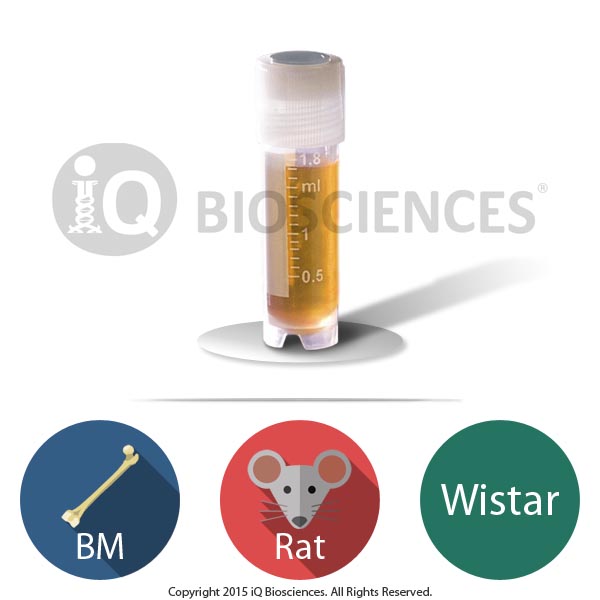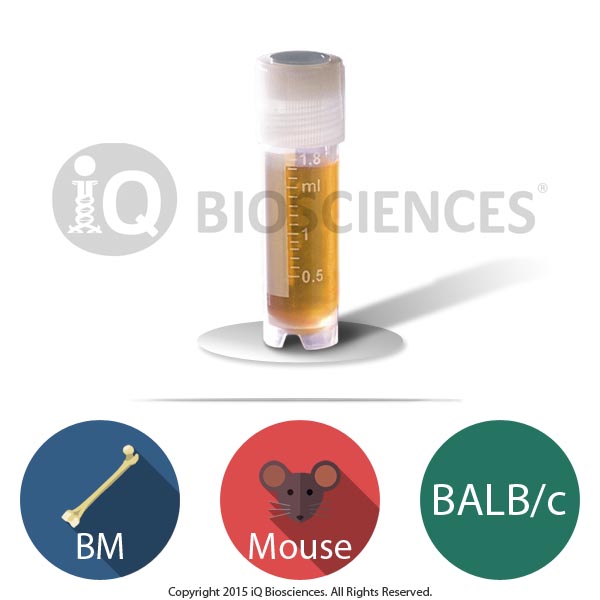- High-quality bone marrow cells from the NZW rabbit, a commonly-used outbred rabbit strain
- High viability (typically > 70%) after thawing
- Used for a wide variety of immunology-based applications, including cell population characterization and differentiation into specific cell types
- All orders come with an iQ Certificate of Analysis
- Normally ships out same business day
New Zealand White Rabbit Bone Marrow Cells
$370.00 – $430.00
Description
About the New Zealand White Rabbit
The New Zealand White Rabbit is arguably the most widely-used outbred rabbit strain in biomedical research. They are commonly used in many fields of research, including dermatology, toxicology, ophthalmology, cardiovascular studies, and antibody production. Because the New Zealand White Rabbit offers an immune response to many pathogens similar to that found in humans, they are also used in immunology research as models for infectious diseases and autoimmune responses. Depending on the parameters of your experiments, cells from New Zealand White Rabbits may offer experimental advantages.
Application Summary for New Zealand White Rabbit Bone Marrow Cells
The bone marrow contains various types of cells with many beginning there as stem cells. Thus, rabbit bone marrow cells are an excellent source for phenotyping and characterizing stem cells. Applications such as multi-parameter flow cytometry are routinely used to characterize and distinguish stem cells from other types or to discover new ones. In addition, these populations, if purified, can potentially be used to differentiate into specific cell types, depending on the culture conditions. Similarly, progenitor cells are also found in the bone marrow and are routinely used to differentiate into monocytes and macrophages. Together, rabbit bone marrow cells can be used to identify and study specific cell populations, as well as differentiate into cell types for functional assays.
Isolation of Bone Marrow Cells
Bone Marrow Collection and Isolation of Cells
Bone marrow is isolated responsibly from NZW rabbits at third party facilities. These facilities are vetted to ensure they operate according to local regulations and laws. Since the facility is local, the marrow is quickly transported to iQ’s facility for processing.
At our facility, bone marrow is carefully removed from the tissue and mechanically dissociated to obtain a single cell suspension under sterile conditions. The suspension is carefully passed through a filter to remove any aggregates, and subsequently depleted of red blood cells. The bone marrow is then frozen based on iQ Biosciences’ quality-controlled cryopreservation protocol to promote recoverability and viability once in the end user’s hands.
Cryopreservation and Storage
Our NZW rabbit bone marrow cells are cryopreserved carefully using iQ Biosciences’ cryopreservation protocol that ensures high viability (typically > 70%) after thawing.
Cells should be stored at < -120°C once they are received, such as within a liquid nitrogen tank (vapor phase).
Additional information
| Available Size(s) | |
|---|---|
| Cell Type | |
| Format | |
| Species | |
| Tissue Type | |
| Viability | Typically > 70% |
For US customers, we ship via FedEx Overnight Shipping. Shipping charges will vary per shipping address (based on ZIP code) and are estimated to be $140.
For international (non-US) customers, we work closely with you and our couriers to ensure all necessary documentation is in place for international shipments to significantly reduce the chance of delays at Customs. For the export of non-human primate samples, this includes preparing CITES permits, as well as any other documentation as required by country. Please submit an inquiry to orders@iqbiosciences.com for your estimated time of delivery and shipping charges.
Austria
Hölzel Diagnostika Handels GmbH
Tel: +49 221 126 02 66
Email: info@hoelzel.de
Web: https://www.hoelzel-biotech.com/
Canada
Cedarlane
Tel: +1 (289) 288-0001
Toll Free (North America): +1 (800) 268-5058
Fax: +1 (289) 288-0020
Email: sales@cedarlanelabs.com
Web: https://www.cedarlanelabs.com
China
BIOHUB INTERNATIONAL TRADE CO., LTD.
上海起发实验试剂有限公司
Address: Chuansha Rd #6619, Pudong, Shanghai, Zipcode: 201200 P.R.China
Tel: 0086-021-50724187
Phone: +86-15921799099
Fax: 0086-021-50724961
Email: sale3@78bio.com
Web: www.qfbio.com
European Union
Caltag Medsystems Ltd.
Email: office@caltagmedsystems.co.uk
Web: https://www.caltagmedsystems.co.uk
tebu-bio
Web: https://www.tebu-bio.com
Or Find a local contact
Germany
Hölzel Diagnostika Handels GmbH
Tel: +49 221 126 02 66
Email: info@hoelzel.de
Web: https://www.hoelzel-biotech.com/
Zageno
Web: https://zageno.com/
Ireland
2B Scientific Ltd
Tel: +44(0) 1869 238033
Fax: +44(0) 1869 238034
Email: sales@2BScientific.com
Web: https://www.2bscientific.com
India
Cell & Gene BioSolutions Pvt. Ltd.
#478 C, SLV Complex, Raghavendra Swamy Mutt Road
Opp. Turahalli Water Tank, Turahalli, Subramanyapura Post
Uttarahalli Hobli, Bengaluru-560061, Karnataka, India
Phone: +91 97317 14670
Phone: +91 98809 25033
Email: info@cgbios.com
Web: www.cgbios.com
Japan
Cosmo Bio Co., Ltd.
Tel: +81 (03) 5632 9610
Fax: +81 (03) 5632 9619
Email: nsmail@cosmobio.co.jp
Web: https://www.cosmobio.co.jp
Qatar
Sedeer Medical Services and Trading LLC
Tel: +974 4434 9191
Email: info@sedeer.com
Web: https://sedeer.com/
Singapore
Omnicell Pte Ltd
Tel: +65 6747 0201
Email: enquiry@omnicell.com.sg
Web: https://omnicell.com.sg/</a
South Korea
BioClone
Tel: +82-2-2690-0058
Email: bioclone@bioclone.co.kr
Web: http://www.bioclone.co.kr
Switzerland
Hölzel Diagnostika Handels GmbH
Tel: +49 221 126 02 66
Email: info@hoelzel.de
Web: https://www.hoelzel-biotech.com/
Taiwan
Hycell International Co. Ltd.
Tel: +886-2-2877-1122
Fax: +886-2-2876-1520
Web: http://www.hycell.com.tw
United Kingdom
2B Scientific Ltd
Tel: +44(0) 1869 238033
Fax: +44(0) 1869 238034
Email: sales@2BScientific.com
Web: https://www.2bscientific.com
Caltag Medsystems Ltd.
Tel: +44 (0)1280 827460
Fax: +44 (0)1280 827466
Email: office@caltagmedsystems.co.uk
Web: https://www.caltagmedsystems.co.uk
tebu-bio
Tel: +44 (0)1733 421880
Fax: +44 (0)1733 421882
Email: uk@tebu-bio.com
Web: https://www.tebu-bio.com
Zageno
Web: https://zageno.com/
United States
Fisher Scientific
Tel: 1-800-766-7000
Web: https://www.fishersci.com
Quartzy
Web: https://www.quartzy.com
VWR International
Tel: 1-800-932-5000
Web: https://www.vwr.com
Zageno
Web: https://zageno.com/
